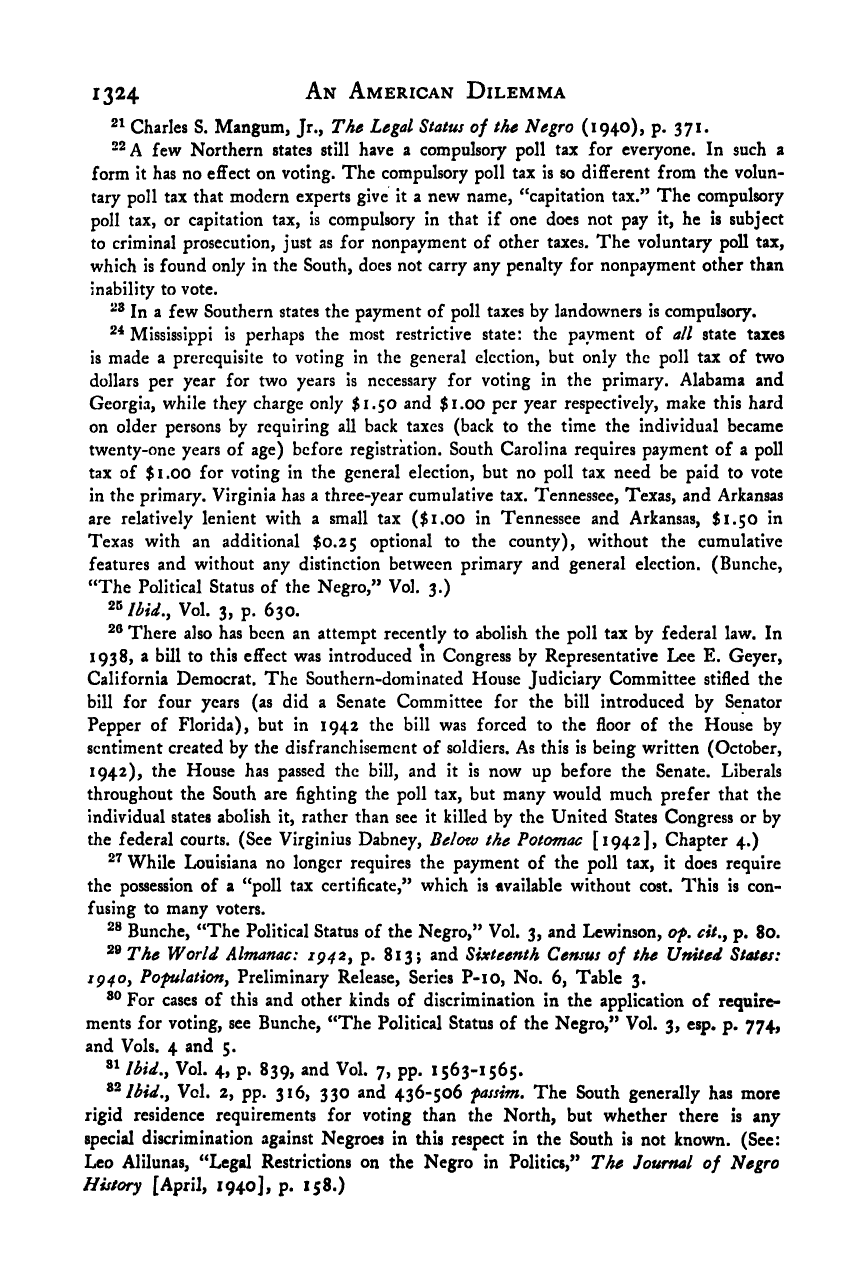Note: Gunnar Myrdal died in 1987, less than 70 years ago. Therefore, this work is protected by copyright, restricting your legal rights to reproduce it. However, you are welcome to view it on screen, as you do now. Read more about copyright.
Full resolution (TIFF) - On this page / på denna sida - Footnotes - Chapter 22

<< prev. page << föreg. sida << >> nästa sida >> next page >>
Below is the raw OCR text
from the above scanned image.
Do you see an error? Proofread the page now!
Här nedan syns maskintolkade texten från faksimilbilden ovan.
Ser du något fel? Korrekturläs sidan nu!
This page has never been proofread. / Denna sida har aldrig korrekturlästs.
1324 An American Dilemma
Charles S. Mangum, Jr., The Legal Status of the Negro (1940), p. 371.
few Northern states still have a compulsory poll tax for everyone. In such a
form it has no effect on voting. The compulsory poll tax is so different from the volun-
tary poll tax that modern experts give it a new name, “capitation tax.” The compulsory
poll tax, or capitation tax, is compulsory in that if one does not pay it, he is subject
to criminal prosecution, just as for nonpayment of other taxes. The voluntary poll tax,
which is found only in the South, does not carry any penalty for nonpayment other than
inability to vote.
In a few Southern states the payment of poll taxes by landowners is compulsory.
Mississippi is perhaps the most restrictive state: the payment of all state taxes
is made a prerequisite to voting in the general election, but only the poll tax of two
dollars per year for two years is necessary for voting in the primary. Alabama and
Georgia, while they charge only $1.50 and $1.00 per year respectively, make this hard
on older persons by requiring all back taxes (back to the time the individual became
twenty-one years of age) before registration. South Carolina requires payment of a poll
tax of $1.00 for voting in the general election, but no poll tax need be paid to vote
in the primary. Virginia has a three-year cumulative tax. Tennessee, Texas, and Arkansas
are relatively lenient with a small tax ($i.00 in Tennessee and Arkansas, $1.50 in
Texas with an additional $0.25 optional to the county), without the cumulative
features and without any distinction between primary and general election. (Bunche,
“The Political Status of the Negro,” Vol. 3.)
Ibid.^ Vol. 3, p. 630.
There also has been an attempt recently to abolish the poll tax by federal law. In
1938, a bill to this effect was introduced in Congress by Representative Lee E. Geyer,
California Democrat. The Southern-dominated House Judiciary Committee stifled the
bill for four years (as did a Senate Committee for the bill introduced by Senator
Pepper of Florida), but in 1942 the bill was forced to the floor of the House by
sentiment created by the disfranchisement of soldiers. As this is being written (October,
1942), the House has passed the bill, and it is now up before the Senate. Liberals
throughout the South are fighting the poll tax, but many would much prefer that the
individual states abolish it, rather than see it killed by the United States Congress or by
the federal courts. (See Virginius Dabney, Belorv the Potomac [1942], Chapter 4.)
While Louisiana no longer requires the payment of the poll tax, it does require
the possession of a “poll tax certificate,” which is available without cost. This is con-
fusing to many voters.
Bunche, “The Political Status of the Negro,” Vol. 3, and Lewinson, of. cit.^ p. 80.
The World Almanac: 1^42^ p. 813; and Sixteenth Census of the United States:
i940y Pofulatiouy Preliminary Release, Series P-IO, No. 6, Table 3.
For cases of this and other kinds of discrimination in the application of require-
ments for voting, see Bunche, “The Political Status of the Negro,” Vol. 3, esp. p. 774,
and Vols. 4 and 5.
Ibid.y Vol. 4, p. 839, and Vol. 7, pp. 1563-1565.
Ibid, Vol. 2, pp. 316, 330 and 436-506 fassim. The South generally has more
rigid residence requirements for voting than the North, but whether there is any
special discrimination against Negroes in this respect in the South is not known. (See:
Leo Alilunas, “Legal Restrictions on the Negro in Politics,” The Journal of Negro
History [April, 1940], p. 158.)
<< prev. page << föreg. sida << >> nästa sida >> next page >>